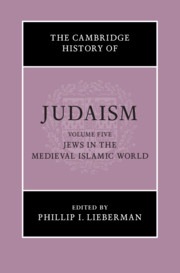Book contents
- The Cambridge History of Judaism
- The Cambridge History of Judaism
- The Cambridge History of Judaism
- Copyright page
- Contents
- Figures
- Acknowledgments
- Introduction
- Part I Jews in the Medieval Islamic World
- Part II Social and Institutional History
- Part III Spiritual and Intellectual History
- Chapter 17 Karaism
- Chapter 18 Non-Rabbinic and Non-Karaite Religious Movements
- Chapter 19 Languages and translation
- Chapter 20 Book Production
- Chapter 21 Jewish Bible Exegesis in Muslim Lands in the Middle Ages
- Chapter 22 Jewish Law
- Chapter 23 Liturgy
- Chapter 24 Piyyuṭ
- Chapter 25 Jewish Philosophy
- Chapter 26 Science and Medicine
- Chapter 27 Magic
- Chapter 28 Mysticism
- Chapter 29 Belles Lettres
- Chapter 30 Jewish-Muslim Polemics
- Chapter 31 Historiography
- Chapter 32 Material Culture, Art, and Architecture
- Index
- References
Chapter 21 - Jewish Bible Exegesis in Muslim Lands in the Middle Ages
from Part III - Spiritual and Intellectual History
Published online by Cambridge University Press: 21 August 2021
- The Cambridge History of Judaism
- The Cambridge History of Judaism
- The Cambridge History of Judaism
- Copyright page
- Contents
- Figures
- Acknowledgments
- Introduction
- Part I Jews in the Medieval Islamic World
- Part II Social and Institutional History
- Part III Spiritual and Intellectual History
- Chapter 17 Karaism
- Chapter 18 Non-Rabbinic and Non-Karaite Religious Movements
- Chapter 19 Languages and translation
- Chapter 20 Book Production
- Chapter 21 Jewish Bible Exegesis in Muslim Lands in the Middle Ages
- Chapter 22 Jewish Law
- Chapter 23 Liturgy
- Chapter 24 Piyyuṭ
- Chapter 25 Jewish Philosophy
- Chapter 26 Science and Medicine
- Chapter 27 Magic
- Chapter 28 Mysticism
- Chapter 29 Belles Lettres
- Chapter 30 Jewish-Muslim Polemics
- Chapter 31 Historiography
- Chapter 32 Material Culture, Art, and Architecture
- Index
- References
Summary
Jewish learning in Muslim lands in the Middle Ages was transformed by its absorption of Muslim and Greco-Arabic learning, which included grammar and philology, poetics, hermeneutics, and philosophy, all of which contributed to the forging of substantially new methods of Jewish Bible exegesis. Earlier Jewish Bible interpretation was dominated by the creative midrashic forms of “rewriting” the Bible, which had been consolidated in the Talmud and various halakhic and aggadic midrashic compilations. But from the ninth century onward, Karaite scholars in the Muslim East rejected rabbinic authority and spearheaded a new philologically oriented exegetical method.
- Type
- Chapter
- Information
- The Cambridge History of Judaism , pp. 701 - 727Publisher: Cambridge University PressPrint publication year: 2021

